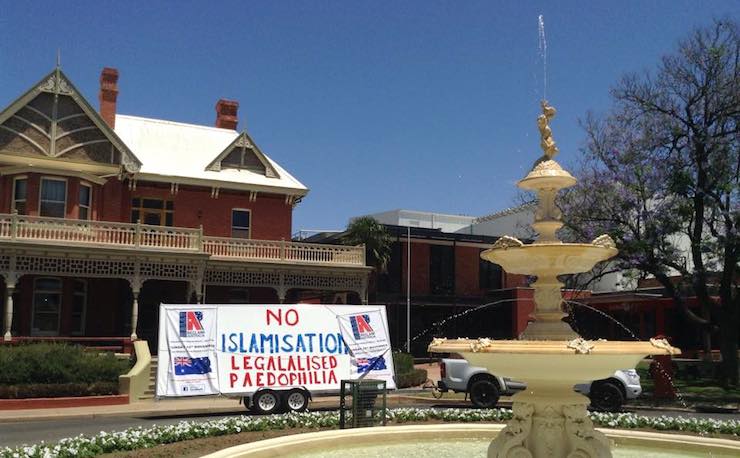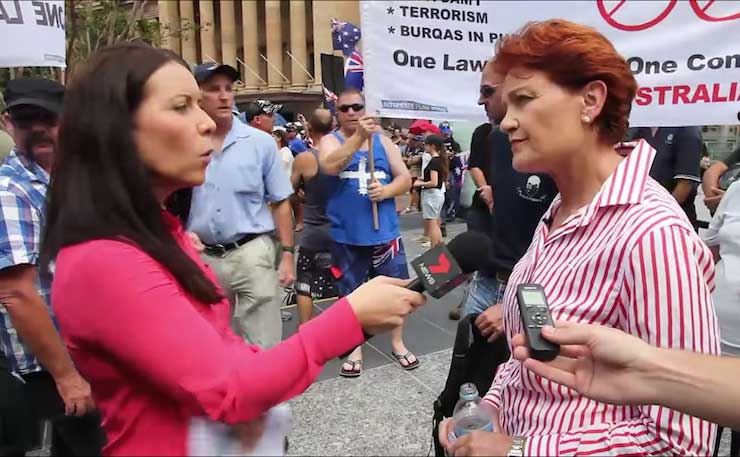There is no way to ‘balance’ unsubstantiated claims that are drawn entirely from prejudice, writes Mostafa Rachwani.
In the wake of Pauline Hanson’s appearance on Q&A on Monday night, many Australian Muslims would have spent time soul searching. Not just because her bizarre, incoherent rambles dominated an otherwise rather interesting episode of the show, but much more on why it is we continue to be exposed to her lunacy.
Why, regardless of her success at the recent election or her ongoing popularity, we as a community have to continue to endure her illogical vitriol on the national stage.
The usual response often revolves around a need to bring balance to the conversation, whether it be on migration or Muslims, or the need to challenge her ideas. However, it struck me on Monday how deeply hollow such sentiments are when, regardless of how many times she is struck down as a racist and a hate preacher, she is continually allowed a platform to spew garbage.
And this is not an isolated case. The Australian media landscape is littered with examples of moronic contributions to public discourse entertained in the name of false balance. That very day, on Monday morning, Channel 9 presenter and personality Sonia Kruger made the argument that Australia needs to curb Muslim migration for her “safety”.
In the name of “freedom of speech” she was provided support by the Channel 9 hierarchy, with the consequences to her racism limited to the gobsmacked looks on her fellow presenters’ faces. She was even allowed more airtime the next day, not to apologise, but to explain herself, doubling down on her sentiments.
Putting aside the legal fiction that is freedom of speech in Australia (we have more laws restricting said freedoms than enshrining them), I fail to reconcile the clear recognition that Kruger had said something derogatory and arguably fascistic with the ongoing pandering to such sentiments in the public eye.
The invented binary that comforts these institutions, that a “balance” is required, fails to stand when these individuals make statements that are outright dangerous and largely unsubstantiated, when anyone outside their ardent fans can see these people as bigoted racists.
Unless, of course, this is just a reflection of racism inherent to any narrative in the public space. How else can anyone logically explain the need to bring hate preachers into a conversation? Are they seeking to balance good will with its opposite, seeing it as one side of a debate as opposed to a norm to be upheld?
The only conclusion to reach is that in both instances, Hanson and Kruger are benefiting and reflecting the privilege that allows them to preach hatred without consequence. And it is that same privilege that allows people like Donald Trump to ride to the GOP Presidential candidacy on a racist mandate, and for Brexit campaigners to build their argument on a hatred of minorities.
In both the UK and the US there have been little to no consequences for those who have espoused such repulsive sentiments. On the contrary, in both of those cases, the espousers arguably benefited in some way.
Their ideas and ideologies are treated as abstract concepts, something to argue about in hypotheticals, to engage with on a fancy stage and wax lyrical about. This fantasy that hatred is an unknown concept that can be combatted with words and ideas is an inherent misunderstanding of the impacts of hate speech.

This fantasy is undermined every day by the structural and physical violence Muslims face, by the abuse and disgusting vitriol served up by people from all levels of Australian society. From online trolls sending Muslims or Islamic organisations disgusting and violent messages almost non-stop, to the lack of financial, educational or political opportunities provided to Muslims, to the deeply rooted lack of representation, the questioning of identity and loyalty, the dehumanisation, on and on and on it goes.
Most relevant here, however, is the way Muslims are never provided the same platform as the racists questioning or dehumanising them. Sure, I can understand that it was the “senators night” on Q&A, however, that doesn’t explain why Sunrise continued to speak to her as a pundit, nor does the same reasoning alleviate Channel 9’s responsibility when it comes to Kruger.
And a responsibility it most certainly is. These media platforms don’t just have an obligation to their bottom line, nor to their agendas, they have a moral responsibility to the people of Australia to avoid incitement of hatred and violence.
It must be said in such instances, attacks on people like Hanson and Kruger are easy. Calling them out for their essentially clueless positions and statements is not a challenge to too many people. Often, it is a reflection on the complexity of targeting structures that uphold and allow such sentiments to grow that celebrities and public figures are often more the target of backlash.
They, and the many overt islamophobes like them, are not the targets that should be taking the criticism. It should be the deeply rooted structural, physical, psychological, and physiological violence that is reflected in the many challenges facing minority communities. It should be the individuals who work towards upholding these systems and remain insidiously quiet in their approach to discrimination and hatred.
These are difficult times for the Muslim community in Australia, and I won’t deny navigating it all is an incredible challenge for anyone, let alone a community bearing the brunt of such violence. Standing against it, however, is as much a responsibility for the ones suffering through it as the ones benefitting greatly from it.
Donate To New Matilda
New Matilda is a small, independent media outlet. We survive through reader contributions, and never losing a lawsuit. If you got something from this article, giving something back helps us to continue speaking truth to power. Every little bit counts.





